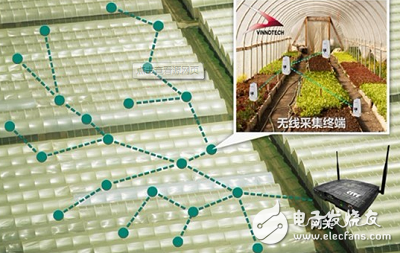According to foreign media reports, the Internet of Things is currently one of the trends that the technology industry cannot ignore. It is estimated that in the next five years, the number of devices, sensors and chips connected to the Internet will exceed 25 billion, and it can handle up to 500 trillion GB of data. So, where should companies cut into the growing Internet market?

Technology development company The Technology Partnership (hereinafter referred to as "TTP") believes that the value of the Internet of Things is not in the "object" - any device with an IP address, but in the sensor network - part of the Internet of Things. TTP executive Steve Taylor said, “There is no point in communicating between objects for communication. The Internet of Things only provides a communication backbone, and the sensor network is like the root of a tree, all types of sensors are collected. And send data to the internet."
The real value of the Internet of Things is to collect and analyze the data generated by sensors located at IoT terminals, and to obtain information that is very important to the enterprise. However, even sensor networks do not provide the information that companies really need. Companies need to consider what kind of information is really important to their future success.
Ultimately, the value of the Internet of Things may come from two directions: to provide an understanding of things that the company did not have before, and to enhance the importance of people in the organization. Ron Exler, an analyst at market research firm Saugatuck Technology, said in a recent report that "the Internet of Things can handle tedious tasks and enable people to focus on more important tasks." Despite the lack of standards, All vendors are involved in the Internet of Things, such as the smart grid in the power industry, wearables in the medical industry, and the Industrial Internet of Things proposed by GE.
Saugatuck Technology expects the Internet of Things to have a major impact on smarter cities, asset management, indoor marketing, crowdsourcing, geospatial, augmented reality, social media and wearables.
Exler pointed out that the Internet of Things will promote the development of cloud computing. "Since the complexity of the Internet of Things drives buyers and many providers to use the most economical and highly scalable existing resources, cloud-based platforms will emerge and Rapid growth. Cloud computing providers can buy/build and manage large amounts of infrastructure."
The Internet of Things will have a fairly high level of intelligence, leading to an "organization" with greater autonomy. Fabio Moioli, a consulting firm at CapGemini, recently said that “the cost of processing has dropped nearly 60 times in the past few years. The networked devices are not only connected to the Internet, but also the next step. It is possible to provide low-cost devices that can take measures autonomously or jointly with other objects, so that 'things' have the ability to self-perceive, predict, react and collaborate."
The Internet of Things is a huge trend that involves a lot of opportunities, but identifying the most important data requires thinking and working closely with decision makers.
With Volvo Engine Diesel Generator
With Volvo Engine Diesel Generator,Volvo Diesel Generator,Volvo Generator,Volvo Power Generator
Shanghai Kosta Electric Co., Ltd. , https://www.shkostagenerator.com